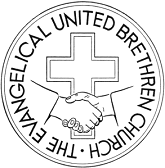This article needs additional citations for verification. (January 2013) |
| Part of a series on the |
| Evangelical United Brethren |
|---|
| Background |
| Doctrinal distinctives |
| People |
| Predecessor groups |
| Related movements |

The Evangelical United Brethren Church (EUB) was a North American Protestant denomination from 1946 to 1968 with Arminian theology, roots in the Mennonite and German Reformed communities, and close ties to Methodism. It was formed by the merger of a majority of the congregations of the Evangelical Church founded by Jacob Albright (excluding those that became the Evangelical Church of North America, along with the Evangelical Congregational Church) and the Church of the United Brethren in Christ (New Constitution) (as opposed to the Church of the United Brethren in Christ (Old Constitution), still extant without the parenthetical).[1] The United Brethren and the Evangelical Association had considered merging off and on since the early 19th century because of their common emphasis on holiness and evangelism and their common German heritage.
In 1968, the United States section of the EUB merged with the Methodist Church to form the United Methodist Church, while the Canadian section joined the United Church of Canada.
- ^ Chisholm, Hugh, ed. (1911). . Encyclopædia Britannica. Vol. 27 (11th ed.). Cambridge University Press. p. 579.